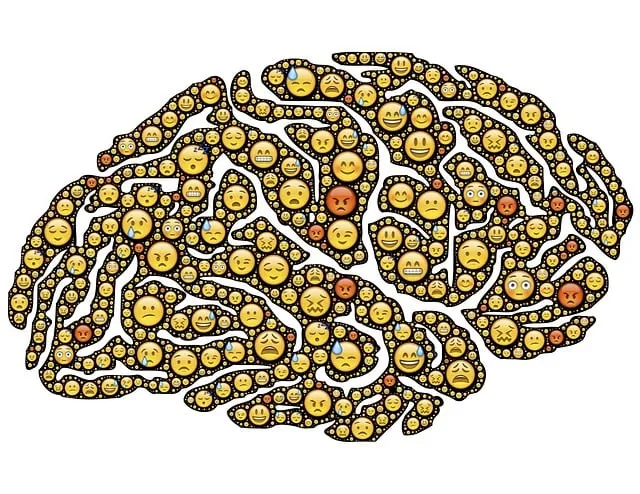Social Skills Training for mental health conditions in Longmont, facilitated by Kaiser's comprehensive coverage and specialized network, offers strategies for managing anxiety, depression, and PTSD in social settings. Incorporating crisis intervention guidance, emotional intelligence development, self-awareness exercises, and supportive environments empowers individuals to build meaningful relationships, reduce isolation, and access resources like Kaiser's mental health services, ultimately enhancing mental wellness.
Social skills training is a powerful tool for individuals navigating mental health conditions, offering them a chance to enhance their interactions and overall well-being. This article explores how such training can improve social functioning, with a focus on Kaiser’s coverage of mental health therapy in Longmont and the key components making these programs effective. We delve into the benefits, providing a real-world impact analysis for those dealing with disorders, and highlighting why access to quality care, like what Longmont’s Kaiser provides, is crucial.
- Understanding Social Skills Training for Mental Health Conditions
- How Kaiser Coverage in Longmont Supports Mental Health Therapy
- Key Components of Effective Social Skills Training Programs
- Benefits and Real-World Impact on Individuals with Mental Health Disorders
Understanding Social Skills Training for Mental Health Conditions

Social Skills Training for Mental Health Conditions plays a pivotal role in enhancing individuals’ ability to navigate and engage with social environments. This type of training is designed to equip people with practical strategies to build and maintain meaningful relationships, often addressing challenges associated with conditions like anxiety, depression, or PTSD. Longmont does Kaiser cover mental health therapy? Yes, comprehensive coverage can include social skills training as part of a holistic treatment plan.
Compassion Cultivation Practices, Mental Wellness Journaling Exercise Guidance, and Crisis Intervention Guidance are among the tools employed in such training. Compassion Cultivation Practices help individuals foster self-kindness and empathy towards others, thereby improving interpersonal interactions. Mental Wellness Journaling Exercises provide structured outlets for processing emotions and experiences, enhancing self-awareness. Crisis Intervention Guidance equips professionals and peers with strategies to de-escalate situations and offer immediate support during crises, contributing to overall mental health stability.
How Kaiser Coverage in Longmont Supports Mental Health Therapy

In Longmont, Kaiser Coverage offers comprehensive support for individuals seeking mental health therapy. Their robust insurance plans are designed to ensure accessibility to a wide range of services, promoting emotional well-being promotion techniques and crisis intervention guidance. Kaiser’s network of specialized therapists and psychiatrists provides personalized care tailored to unique needs, making it an ideal choice for those navigating mental health challenges.
The healthcare provider also emphasizes compassion cultivation practices, recognizing their role in fostering supportive environments. Through these practices, Kaiser aims to create a sense of belonging and understanding, which is crucial for individuals working towards recovery. By covering mental health therapy and integrating evidence-based approaches, Kaiser Coverage in Longmont plays a vital role in enhancing the emotional resilience of its community members.
Key Components of Effective Social Skills Training Programs

Social Skills Training Programs for mental health conditions should incorporate several key components to be effective. First and foremost, Crisis Intervention Guidance is vital, equipping individuals with strategies to manage intense emotions and de-escalate situations. This includes teaching recognition of early warning signs of a crisis and practicing coping mechanisms. Second, integrating Emotional Intelligence into the curriculum helps participants understand and regulate their own emotions as well as interpret others’ emotional cues accurately.
Additionally, Self-Awareness Exercises are essential for personal growth. These exercises encourage introspection, helping individuals identify their strengths, weaknesses, values, and beliefs. By fostering self-awareness, participants can build confidence in social interactions, improve communication, and develop healthier relationships. Programs should also offer a safe, supportive environment where learners feel comfortable practicing new skills and receiving constructive feedback.
Benefits and Real-World Impact on Individuals with Mental Health Disorders

Social skills training offers a multitude of benefits for individuals living with mental health conditions. By learning and practicing effective communication strategies, individuals can enhance their relationships, improve social connections, and boost their overall sense of belonging. This form of training equips them with the tools to navigate social situations with confidence, fostering a sense of comfort and control that was previously lacking.
In real-world settings, these skills translate into improved access to support networks and reduced feelings of isolation. For instance, someone struggling with anxiety may learn to recognize and manage their triggers in social environments, allowing them to participate more fully in community activities and engage in meaningful interactions at work or school. Longmont residents who receive such training often find that it empowers them to seek out mental health resources, like those provided by Kaiser, and utilize them effectively, ultimately contributing to improved mental wellness.
Social skills training plays a pivotal role in enhancing the lives of individuals with mental health conditions, fostering better coping strategies and improving their ability to navigate social environments. As organizations like Kaiser in Longmont continue to provide comprehensive mental health coverage, access to these therapeutic programs becomes more accessible. By integrating key components such as role-playing exercises and cognitive behavioral techniques, social skills training offers tangible benefits, enabling individuals to manage symptoms, build confidence, and improve overall well-being in a supportive setting.






